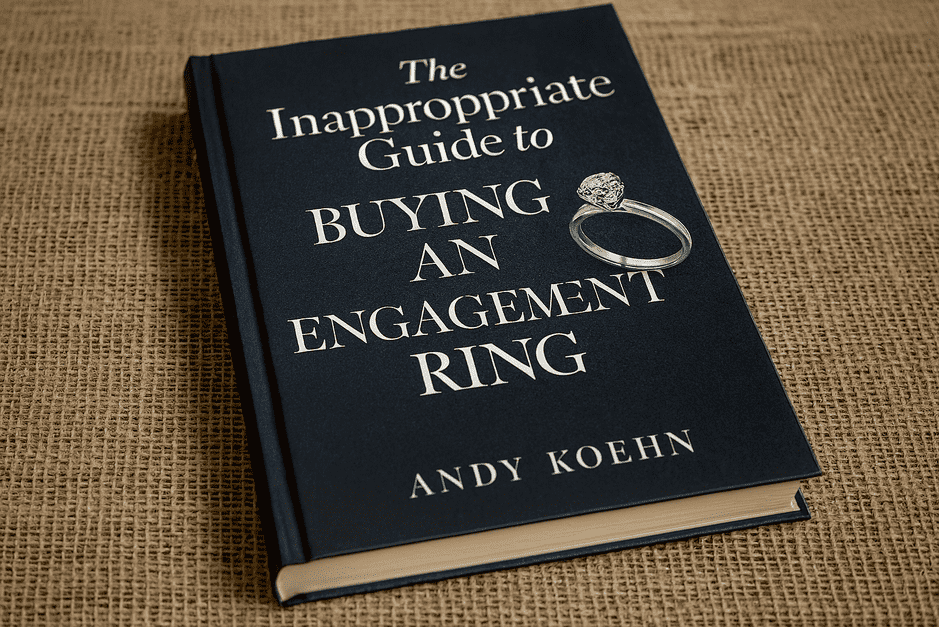Introduction
If you’re nervous about shopping for a ring, The Inappropriate Guide to Buying an Engagement Ring by Andy Koehn of Koehn & Koehn Jewelers is exactly what you need. This book is raw, practical, and full of real-world advice that helps you cut through the noise of jewelry store sales tactics. Unlike the polished brochures you usually find, Andy delivers straight talk based on decades of experience in the diamond trade.
Why the Inappropriate Guide Engagement Ring Book Matters
Buying an engagement ring is overwhelming for most shoppers. Studies show that 72% of first-time buyers feel pressured into overspending. Andy Koehn tackles that stress head-on. His Inappropriate Guide to Buying an Engagement Ring explains what truly matters and what doesn’t—without the fluff.
“The key is not to buy the ring the jeweler wants to sell you. The key is buying the ring your partner will actually love.” – Andy Koehn
Who Is Andy Koehn of Koehn & Koehn Jewelers?
- Fourth-generation jeweler at Koehn & Koehn Jewelers (over 100 years in business)
- Recognized speaker at national jewelry events
- Known for no-nonsense advice that makes buying jewelry approachable
Key Lessons from the Inappropriate Guide Engagement Ring Book
Most jewelry advice feels scripted. Andy’s book flips the script with:
- Blunt honesty
- Relatable stories
- Budget-friendly strategies
- Clear tips on diamond quality
Case Study: Shoppers Who Used the Inappropriate Engagement Ring Guide
A customer ready to spend $10,000 used Andy’s approach and bought a ring under $6,500. His fiancée loved it, and he avoided unnecessary stress.
FAQs About Andy Koehn’s Engagement Ring Guide
Q: Is the book beginner-friendly?
Yes, it’s written for first-time ring buyers who want clarity.
Q: Will it help me save money?
Yes. Many readers save 15–30% by avoiding overpriced options.
Q: Where can I learn more about diamonds?
Check out the guide on diamond grading basics.
Q: What about gold purity?
Read the article on 24K, 22K, and 18K gold differences.
Q: Buying in India?
Don’t miss our post on BIS hallmark standards.
Further reading suggestions:
- diamond grading basics, 24K vs 22K vs 18K gold, BIS hallmark guide, common mistakes in gemology
- Koehn & Koehn Jewelers official website
Introduction
This Responsible Travel FAQ provides comprehensive answers to help you make ethical tourism choices.
Our guide covers eco-friendly accommodations, local community support, sustainable transportation, cultural respect, wildlife ethics, and ways to reduce waste.
Following these practices ensures your adventures benefit both destinations and travelers.
What is Responsible Travel and Why Does It Matter?
Responsible travel means making conscious choices that minimize negative impact while maximizing benefits for local communities and the environment.
Tourism generates $1.4 trillion annually but produces 8% of global carbon emissions.
Your travel decisions affect local economies, cultural preservation, and environmental conservation.
How Do I Choose Sustainable Accommodations?
Look for eco-certifications such as:
- Green Key
- LEED building standards
- EarthCheck approval
- Rainforest Alliance verification
Check if hotels use renewable energy, water-saving systems, and source food locally.
Ask about waste reduction programs and community involvement. Calling properties directly helps verify claims.
Transportation Options for Responsible Travel
- Train travel emits 80% less carbon than flying for similar distances.
- Choose direct flights when necessary and book economy class.
- Use public transport, bicycles, or walk instead of renting cars.
- Consider verified carbon offsets for unavoidable flights.
Supporting Local Economies
- Buy from locally-owned businesses instead of chains.
- Book community-based tours with local guides.
- Eat at family-owned restaurants with local ingredients.
- Stay in homestays or boutique hotels rather than international chains.
- Purchase authentic handicrafts fairly from artisans.
Packing Tips for Responsible Travel
- Reusable water bottle with filtration
- Solid toiletries to reduce plastic
- Reef-safe mineral sunscreen
- Reusable shopping bags
- Bamboo or metal utensils
- Portable laundry soap
Pack light and choose durable, multipurpose items.
Respecting Local Cultures
- Learn cultural customs, dress codes, and etiquette.
- Learn basic local phrases.
- Dress appropriately for religious and conservative areas.
- Ask permission before photographing people.
- Participate respectfully in cultural activities.
Ethical Wildlife Encounters
- Maintain safe distances and avoid feeding animals.
- Choose conservation-focused sanctuaries, not entertainment attractions.
- Avoid elephant rides, direct contact, or photo opportunities with captive animals.
- Use certified naturalist guides who prioritize welfare and habitat protection.
Reducing Waste During Travel
- Use reusable containers, bags, and utensils.
- Refuse single-use plastics.
- Choose digital tickets and receipts.
- Carry a small trash bag where disposal is limited.
Questions to Ask Tour Operators
- Are staff local and fairly paid?
- How does your business give back to communities?
- What environmental practices are in place?
- Are group sizes limited to reduce pressure on sensitive areas?
- Are wildlife experiences ethical and conservation-focused?
Money and Overtourism Practices
- Use local ATMs and tip according to local customs.
- Support social enterprises and cooperatives.
- Visit during shoulder seasons, off-peak hours, or lesser-known areas.
- Stay longer in fewer destinations.
Responsible Travel on a Budget
- Cook using local market ingredients.
- Use public transportation.
- Stay in local hostels, guesthouses, or homestays.
- Explore free cultural events or walking tours.
- Exchange skills or volunteer for free accommodation.
Pre-Travel Research
- Learn about environmental challenges and cultural sensitivities.
- Check seasonal weather and political situations.
- Identify local organizations to support.
- Read destination-specific responsible travel guides.
Creating a Positive Impact Post-Travel
- Share authentic stories on social media.
- Write detailed reviews for responsible businesses.
- Continue supporting local organizations.
- Apply sustainable practices in daily life.
- Recommend responsible travel to others.
Learn more:




